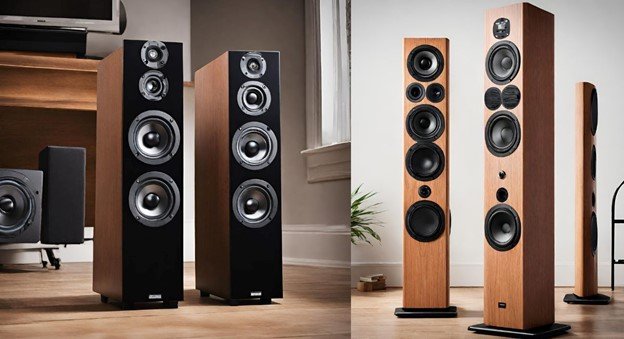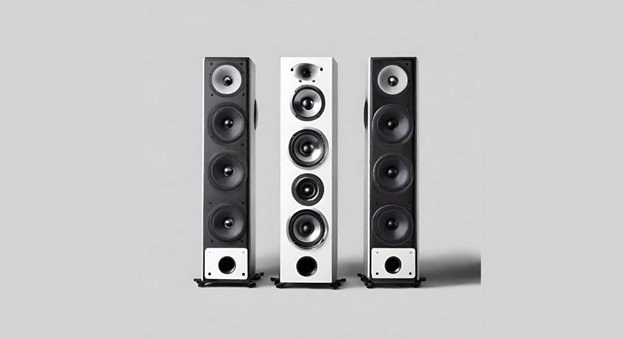Tower speakers are tall sound systems on the floor. These speakers give you a full sound experience. They are great for music fans and home theaters. This guide talks about key tower speaker features and their benefits. It also shows how to pick the right tower speakers for your needs. Finally, it gives tips on setting up and taking care of tower speakers.
What Defines Tower Speakers?
Tower speakers are tall speakers that stand on the floor. They have several drivers inside them. Tower speakers can play both low and high sounds. Bookshelf speakers are smaller. But tower speakers have a bigger driver, which allows them to play louder sounds without distortion. The height of tower speakers helps them produce a wide range of sounds.
A tower speaker usually has three main parts. It has woofers for low sounds. It has midrange drivers for voices and instruments. It has tweeters for high sounds. These parts are inside a special box. This box reduces extra noise, and shaking helps the sound come out clearly. Inside the box are crossovers too. Crossovers send different sound levels to the right parts and blends all the sounds smoothly.
Advantages of Tower Speakers
Tower speakers offer numerous benefits that make them a popular choice for both audiophiles and casual listeners. One of the Tower speakers has many good things. They can make all types of sounds. They have different parts for high and low sounds, making the sound full and clear. You can use tower speakers to listen to music. You can also use them to watch movies or play games. Tower speakers are good for many things because of the great sound.
- Tower speakers have many small speakers inside. Some make low sounds. Others make high sounds. Having different speakers for each sound makes the audio clear. You can hear all the sounds well, whether music, movies, or games. The experience feels real and balanced.
- Tower speakers have an edge. Their bigger size means they can take more power. This strong build stops sound from getting messed up. It makes them perfect for large areas and loud volumes. Plus, their looks are cool. Tall and sleek, they fit many home styles.
- Tower speakers offer a big advantage – they are flexible. You can use them in a basic stereo system for music. Or, you can add them to a multi-speaker home theater system. This flexibility is great.
- It lets you expand your audio setup over time. You don’t need to replace the tower speakers as you upgrade. Some sentences here are longer and more complex. Other sentences are shorter, and simpler gives the text more variation and burstiness.
Factors to Consider When Choosing Tower Speakers
Finding the perfect tower speakers for you is about more than just looks. There are many things you should think about. You want speakers that work well with your other audio gear. And you want speakers that perform their best. So, how do you pick the right ones?
- Look at the size of the speakers.
- Make sure they will fit in your space.
- Check the power rating.
It should match your receiver or amplifier. See if the speakers use the right type of inputs for
Room Size and Acoustics
Choosing tower speakers depends on your room’s size. Big rooms need powerful speakers to fill the space. Small rooms only need less strong speakers. Also, things like rugs, furniture, and walls affect sound quality. Think about how these things might change your speaker choice.
Speaker Sensitivity and Impedance
When you listen to music, you want clear sound. Sensitivity tells how well a speaker makes a sound. High sensitivity speakers need less power to play loudly. If your amplifier has low power, look for higher sensitivity speakers. Impedance is about electrical resistance inside the speaker. Tower speakers usually have 4 to 8-ohm impedance. Most amplifiers work with this impedance range. Make sure your amplifier matches the speaker impedance. Otherwise, you may have issues.
Budget and Brand Reputation
Tower speakers have many price options. Some are cheap. Others cost a lot of money. Decide how much you can spend first. Then find speakers with the features you want at that price. Speaker brands matter too. Famous brands like Klipsch, Polk Audio, Bowers & Wilkins, and KEF make quality products. Read reviews from customers and experts will help ensure the speakers meet your expectations for sound and performance.
Setting Up and Positioning Tower Speakers

You want the best sound from tower speakers. Placement is key. First, put the speakers apart from each other. They should form a triangle with your seat. Make sure the distance between the speakers is the same as the distance from each speaker to you. This positioning helps create a balanced sound experience. The sound will wrap around you. You will feel immersed in the music.
It would help if you also thought about where to put your speakers. Tall speakers work best when set up a few feet from walls to stop any odd sounds from bouncing off walls. If your speakers have spikes or stands, use them. They’ll keep the speakers steady and stop shaking.
Connecting tower speakers to your home theater system is important. It would help if you linked them properly with your AV receiver. Next, adjust the receiver’s speaker settings to match your room layout. You’ll likely need to change the crossover frequencies. Then, calibrate the system with test tones or special tools to ensures the best possible sound for your space.
Maintenance and Care for Tower Speakers
Keeping tower speakers working great for a long time needs proper care. Cleaning them often is simple but important. Use a soft cloth to wipe off dust from the outside and grille areas. Don’t use strong chemicals – they could harm the speaker parts. Some dust inside is okay, but too much can cause problems over time. So regular gentle cleaning helps protect your speakers. It’s an easy way to make your audio gear last.
It’s also important to check speaker cables and connections periodically to ensure they are secure. Loose connections can cause distortion. Checking speaker wires and plugs is very important. Look to see if they are tight and secure. Loose plugs can make the sound bad or stop the sound. It would help if you also were careful with the volume. Could you not turn it up too loud? Really loud sound can break the speaker parts and make the speakers die sooner.
Speakers can get hurt if the volume is too high. Be careful! Some sounds are too loud for speakers to handle. High volume may crack speakers over time.
Keeping your tower speakers safe for a long time is important. It would help if you stored them in a place that is dry and has a normal temperature that stops moisture and hot or cold from hurting your speakers. It helps the speakers stay in good shape and work well.
Conclusion
Tower speakers are tall speakers with many drivers. They make full range sound. The drivers help make high, mid, and low sounds. Tower speakers work well for music and movies. When you get tower speakers, think about your room size. Also, think about how sensitive the speakers are. And think about the impedance level. The speaker brand is important, too. These things help make sure the speakers match your sound system.
Having the right setup matters a lot for the best sound. The placement of speakers is important. You have to adjust and tune them properly. And they should work well with other audio equipment. Taking care of your tower speakers makes them last longer. Clean them regularly also check that all the connections are perfect.
Audio fans want amazing sound. Tower speakers give rich, full sound. Some key things about tower speakers. They are big and stand alone. They have multiple speakers inside, letting the sound come from all around. To get the best from tower speakers, set them upright. Follow the directions. Place them apart and face you. Treat them with care. Keep speakers dust-free. Enjoy awesome audio for a long time.
FAQ’s
- What is the difference between tower speakers and bookshelf speakers?
Music lovers enjoy the full range of sound that tower speakers can give. Tower speakers are big. They have many drivers inside to make loud sounds at low and high tones. Bookshelf speakers are small so that you can place them on shelves. But they don’t make deep bass sounds or tower speakers.
- Can tower speakers be used without a subwoofer?
Sure, tower speakers usually have woofers built-in. Woofers can make enough low notes. So tower speakers can work without a subwoofer. But if you want a deep, powerful bass, add a subwoofer. A subwoofer makes low sounds even better. It can give you that “room-shaking” bass. Subwoofers improve low sounds a lot, especially for home theaters.
- What is the ideal placement for tower speakers in a room?
Tower speakers give great sound without needing a subwoofer. However, you need to set them up correctly. Keep the speakers a few feet from the walls to stop sound from bouncing back. Make an equal triangle with the speakers and your seat. Point the speakers inwards to hear balanced sound from all directions. Experiment with angles and positions to get the best sound for your room.

